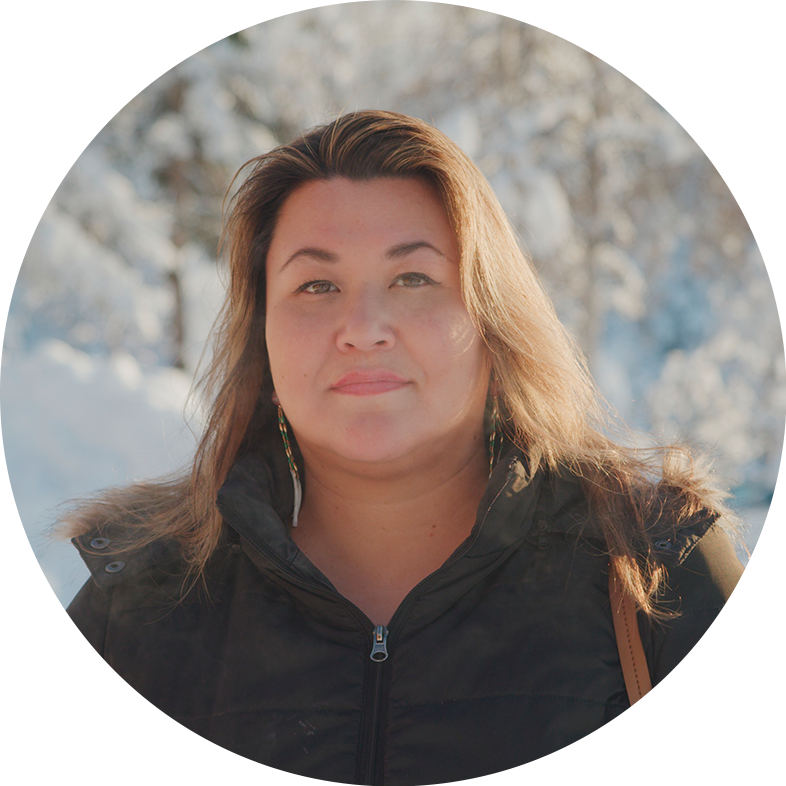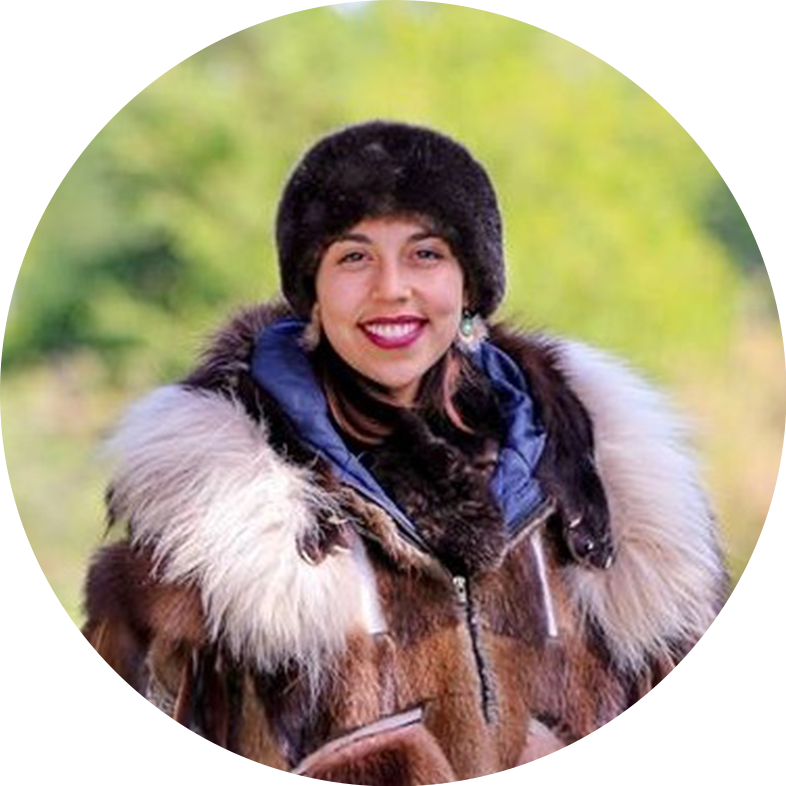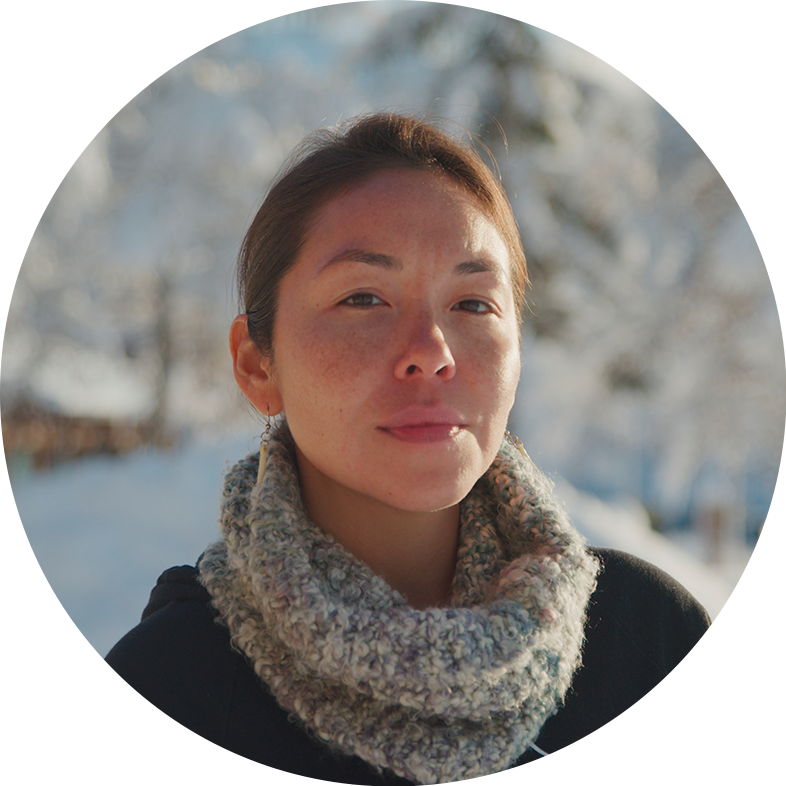
Torin Jacobs, aka RiverFlowz, was born into the community of Mamterilleq (Bethel), Alaska to Blanche Jacobs (Andrews) from Lenapehoking, Philadelphia and Herbert (Kenick) Jacobs from Naparyaarmiut (Hooper Bay), Alaska. His maternal grandparents are Sarah Andrews and John Fisher Davis from Lenapehoking, Philadelphia and his paternal grandparents are Mary Alice Jacobs (Menzo) from Naparyaarmiut, and Hultman (Kenick) Jacobs from Saktuliq (Shaktoolik), AK. Torin grew up mostly in Mamterilleq with several early years spent in Lenapehoking, Philly. While serving in the U.S. Marine Corps, he began exploring his talent for music making, first through rap, then by blending sounds from his cultural background in beatmaking. He is first and foremost a family man – husband, father, uncle, brother – and music-making has taken the back burner over the last seven years while he has focused on the role of father and caretaker to six children. His well-being, resilience, and radical self-care and healing journey are his activism – he is breaking cycles, crushing stereotypes, raising healthy and happy human beings, and participating in the uplifting of his community as a leader and friend. He uses his music to tell his story, to spread love and positive messaging, and to honor his peoples.
I generated a lot of ideas before finally settling on this piece. My artistic component is an instrumental. Listening to it silently is one way of taking it in, but the real power comes in the active participation of the listener to use their own voices via narration, singing, rapping, or any other manner of sound creation in conjunction with the music playing. Anyone and everyone will be part of the art by being guided through the rhythm of the drums. By actively engaging, each person becomes part of the collective story of our people through this art form. It is not simply consumed, it is co-created.
I encourage the use of excerpts from biographies, speeches, and other collections of Native quotes such as those from the Alaska Native Quotations Repository Facebook group to be read aloud by the listener. Additionally, if the listener has any form of media on their phone from audio recordings of elders to video recordings of baby talk, I highly encourage the actual playing of that for the listener to actively mix the sounds thereby creating their own real time, real life soundtrack.
This is meant to be fun and engaging in any way the listener feels moved to engage with the piece, dancing and head-bobbing included.





“None of us have had to say where our expertise comes from … everyone understands that we are standing on thousands and thousands of years of cultural knowledge about one specific place on this planet and that is so deep. The mutual respect and understanding is already there so you just get to the deeper topics right away. Our approach is very holistic. We can talk about anything from language revitalization, to building an economy, to food security.”
Apapi, AlexAnna, was raised in the Village of Igiugig. A granddaughter of John and Mary Olympic and the second oldest child of Dan and Julia Salmon. In 2008, she graduated from Dartmouth College with a dual Bachelor of Arts degree in Native American Studies and Anthropology. After graduating, she returned to work for the Igiugig Tribal Village Council as President and Program Director. She also serves as a member of the Igiugig Native Corporation board, as well as the Lake and Peninsula Borough Planning Commission, and the subregional health board. She is enrolled in the Department of Alaska Native Studies and Rural Development Master of Arts program at the University of Alaska, Fairbanks.

“Building on top of our Indigenous Knowledge, uplifting that and moving toward sustainable practices and deciding what is good for our land, and what is good for our people, and how can we all do this together … We’re a part of something that is so much bigger than ourselves. We are all creating what this is now so it’s hard to say where this is going to take us but we sure know it’s going to be amazing because it comes from a place of love, and our values, and community, and homelands, and traditions.”
Geh Gii Ch’adzaa, Rochelle, is from the Interior Alaskan villages of Beaver and Fort Yukon. Her parents are Angela Peter-Mayo of Fort Yukon and the late Cliff “Tuffy” Adams Jr. of Beaver. Her maternal grandparents are Susan (Lord) and Johnny Peter Sr. Her paternal grandparents are Hannah “Babe” (VanHatten) and Cliff Adams Sr. She was raised living a traditional Athabascan lifestyle with her family following the seasonal cycles of hunting, fishing and trapping off of the Yukon River. These are the values and connections that guide her today and she proudly represents this in all parts of her life and work. She is the mother of three teens, which she is raising with these same values of connectedness, love and respect. Through her many roles and actions, Rochelle has continuously sought to bring her perspective as an Indigenous woman with cultural knowledge, born of the lands and waters, training from the elders with a vision of the future generations to empower Native people everywhere. “It’s important that we as Indigenous people are able to shape the world that we live in to ensure the well being of our people on our own traditional homelands and in our own languages.

“When we think about a sustainable future, it is about returning to and a reclamation of our values, rather than just a pivot away from them. It is more coming home to our ideas and beliefs that we know are so sacred and inherent to who we are.”
Iñuraaq, Kaylene, is Iñupiaq from Sitñasuak (Nome), Alaska. She is the daughter of Bobby Evans of Sitñasuak and Kathleen Jaycox of Katyaak and the granddaughter to the late Laura (Sockpick) Evans of Kiġiktaq, Bob Evans of Minnesota, and the late Myrtle Wells of Katyaak. Upon receiving her master of arts in Indigenous Politics from the University of Hawaiʻi, Mānoa, she returned to Alaska to strengthen her connection to her community, nuna, and traditions. Iñuraaq is a poet, retracing Iñupiat creative traditions. She is passionate about individual and collective healing through the rejection of colonial ideologies and lifestyles, and a return to Indigenous languages, homelands, and values.

“We can mentor the rest of the world as they try to come up with solutions and come up with a model. We have the model. We have the knowledge of what it means to be in relationship to land and place. We lived in balance and so as the the rest of the world desperately looks for hope and sustainable living, transitions, we as Native people can help unlock that and help articulate and show the rest of the world what we can come back to.”
Akall’eq, Andrea, is a community activist from Bethel, Alaska now living and working on the lands of Kānaka ‘ōiwi (Native Hawaiians). She is a Yup’ik Tribal citizen of the Native Village of Kwinhagak. Andrea serves as the President of Native Peoples Action and as a co-founder of Native Peoples Action Community Fund where her role is to advance Indigenous ways of being and knowing in the Just Transition movement. She is Company Owner of With Real People, a consulting and production based firm in Alaska and Hawaii. She is also Global Director of the Conservation in Partnership with Indigenous Peoples and Local Communities program at The Nature Conservancy. Andrea has a bachelor’s degree in government/political science from Georgetown University and spent several years working for Alaskans in Congress on Capitol Hill.